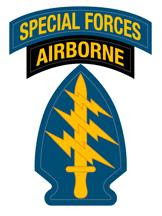
Part of an ongoing series of posts about the history of US Army Special Forces to include more than 200 years of unconventional warfare history; "Swamp Fox" Francis Marion, the Confederate partisan cavalry raiders of Colonel Mosby and Colonel John Morgan, the WWII OSS Jedburgh Teams, OSS Detachment 101 in Burma, the Alamo Scouts, and the 8240th Partisan Infantry in the Korean War. Since 1952, Special Forces have served in Vietnam, El Salvador, Panama, Haiti, Somalia, Bosnia, Kosovo, and in the current conflict in Afghanistan, Iraq, the Philippines, and the Horn of Africa.
Special Forces traces its lineage back to before the Revolutionary War. Rogers' Rangers was an independent militia company of Rangers attached to the British Army during the French and Indian War, also known as the Seven Years War. The unit was informally trained by Major Robert Rogers as a rapidly deployable light infantry force tasked with reconnaissance and conducting operations against distant targets.

Rogers' Rangers operated primarily in the Lake George and Lake Champlain regions of New York. The unit was formed during the severe winter of 1755 by provincial forces entrenched at Fort William Henry. The Rangers frequently undertook winter raids against French towns and military emplacements, traveling on crude snowshoes and across frozen rivers.
Their military tactics were so bold and effective that the unit became the chief scouting unit of British Crown forces in the late 1750s. Rogers' Rangers were one of the few non-Indian forces able to operate in the inhospitable region due to the harsh winter conditions and mountainous terrain.
Never fully respected by the British regulars, the Rangers were nonetheless highly valued for gathering intelligence about the enemy. Ironically, several members of Rogers' Rangers became influential leaders in the American Revolutionary War and a large number of ex-Rangers were present as patriot militiamen at the Battle of Concord Bridge.
After the events at Lexington and Concord,, Robert Rogers offered his help to the commander of the Colonial Army, George Washington. Washington refused, fearing that Rogers was a spy because Rogers had just returned from a long stay in England. Rogers was infuriated by this and did indeed join the British—forming the Queen's Rangers (1776) and later the King's Rangers.
Also claiming descent from Rogers' Rangers is the U.S. Army Rangers.


No comments:
Post a Comment